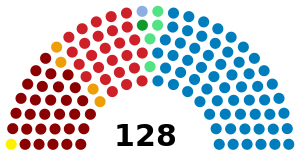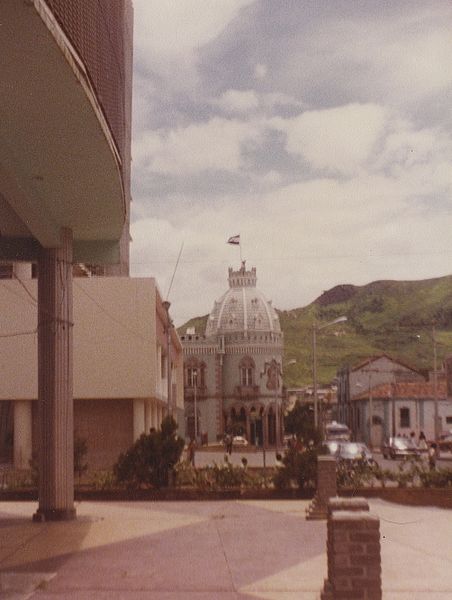Nationalkongress (Honduras)
| Nationalkongress von Honduras | |
|---|---|
 | |
| Basisdaten | |
| Sitz: | Palacio Legislativo in Tegucigalpa |
| Legislaturperiode: | 4 Jahre[1] |
| Abgeordnete: | 128[1] |
| Aktuelle Legislaturperiode | |
| Letzte Wahl: | 28. November 2021 |
| Vorsitz: | Mauricio Oliva Herrera, PNH |
 | |
| Sitzverteilung: | Regierung Partido Nacional de Honduras (61) Alianza Patriótica Hondureña (4) Partido Demócrata Cristiano de Honduras (1) Unificación Democrática (1) Opposition Partido Libertad y Refundación (30) Partido Liberal de Honduras (26) Partido Innovación y Unidad (4) Partido Anticorrupción (1) |
| Website | |
| www.congresonacional.hn | |
Der Nationalkongress von Honduras (spanisch: Congreso Nacional) ist das Parlament in Honduras.
Der Nationalkongress besteht aus einem Einkammersystem. Parlamentsvorsitzender ist seit 2014 Mauricio Oliva. Im Nationalkongress sitzen 128 Abgeordnete, die für vier Jahre gewählt werden.
Wahlen
Nach dem Putsch in Honduras 2009 kam es zu Parlamentswahlen im November 2009. Die letzten Wahlen fanden am 28. November 2021 statt.[2]
Parlamentsgebäude
Das Parlament befindet sich im Gebäude Palacio Legislativo im Zentrum von Tegucigalpa.[3] Der Bau wurde 1951 beschlossen, sollte 450.000 Lempira kosten (schließlich: 1,4 Millionen) und wurde vom Architekten Mario Valenzuela gebaut.[4]
- Bilder
- Fassade des Parlamentsgebäudes in Tegucigalpa, 2007
- Blick auf den alten Präsidentenpalast, Parlamentsgebäude links, 1980
Weblinks
Einzelnachweise
- ↑ a b HONDURAS (Congreso nacional), General information. In: IPU PARLINE database. Abgerufen am 13. Dezember 2016.
- ↑ Parlamentswahl in Honduras auf electionguide.org (englisch), abgerufen am 28. Januar 2022.
- ↑ Honduras. In: places-of-power.org - A Wiki on National Parliament Buildings Worldwide. Abgerufen am 13. Dezember 2016.
- ↑ Historia de Honduras - APUNTES HISTÓRICOS DEL CONGRESO NACIONAL DE HONDURAS. Abgerufen am 15. Dezember 2016.
Koordinaten: 14° 6′ 13,5″ N, 87° 12′ 17,8″ W
Auf dieser Seite verwendete Medien
| Flagge von Bolivia* | |
|---|---|
| country | Template:I18n/Republic of Bolivia |
| genutzt von | Bolivia |
| von | 1851 |
| bis | Present |
| entworfen von | Government of Bolivia |
| Format | 15:22 |
| Form | Rechteck |
| Farben | Rot, Gelb, Grün
Flagge hat 3 horizontale Streifen |
| sonstige Eigenschaften | A horizontal tricolor of red, yellow and green. |
Das Bild dieser Flagge lässt sich leicht mit einem Rahmen versehen
Autor/Urheber: See File history below for details., Lizenz: CC0
Die Flagge Dominicas.
Die Flagge der Dominikanischen Republik hat ein zentriertes weißes Kreuz, das bis zu den Rändern reicht. Dieses Emblem ähnelt dem Flaggendesign und zeigt eine Bibel, ein Kreuz aus Gold und sechs dominikanische Flaggen. Um den Schild herum sind Oliven- und Palmzweige und oben am Band steht das Motto "Dios, Patria, Libertad" ("Gott, Land, Freiheit") und zur liebenswürdigen Freiheit. Das Blau soll für Freiheit stehen, Rot für das Feuer und Blut des Unabhängigkeitskampfes und das weiße Kreuz symbolisierte, dass Gott sein Volk nicht vergessen hat. "Dominikanische Republik". Die dominikanische Flagge wurde von Juan Pablo Duarte, dem Vater der nationalen Unabhängigkeit der Dominikanischen Republik, entworfen. Die erste dominikanische Flagge wurde von einer jungen Dame namens Concepción Bona genäht, die in der Nacht des 27. Februar 1844 gegenüber der Straße von El Baluarte, dem Denkmal, an dem sich die Patrioten versammelten, um für die Unabhängigkeit zu kämpfen, wohnte. Concepción Bona wurde von ihrer Cousine ersten Grades unterstützt Maria de Jesús Pina.
Die National- und offizielle Staatsflagge von Haiti. Die Zivilflagge findet sich hier.
Flag of Canada introduced in 1965, using Pantone colors. This design replaced the Canadian Red Ensign design.
Flagge Trinidad und Tobago
Autor/Urheber: Jfblanc, Lizenz: CC BY-SA 4.0
Flag of Martinique from May 2019 to November 2021.
The coat of arms of Honduras was created on October 3, 1825. Dionisio Herrera, as the Head of State of Honduras, decreed through his initiative, Honduras acquired its own national shield, one which represents Honduran history and the rich variety of national resources that it possesses and which should be protected and conserved. The National Congress thereby declared in its decree #16 and article 142, designated the shield as a national symbol for all uses, in a clear and general manner. The National Congress approved this in Tegucigalpa on January 10, 1935. (http://www.honduras.com/official/)
The National Congress decrees:
Article 1 - The National Coat of Arms that shall be used is an equilateral triangle. On its base is a volcano between two castles, over them is a rainbow and below it [and] behind the volcano a sun rises spreading light. The triangle [is] placed over land which appears to be bathed by both seas [Atlantic and Pacific]. Around it an oval containing in gold lettering: "REPUBLICA DE HONDURAS, LIBRE, SOBERANA E INDEPENDIENTE. 15 DE SEPTIEMBRE DE 1821" [Republic of Honduras, Free, Sovereign and Independent. 15th September 1821] On the top part of the oval there is a quiver full of arrows from which hang horns of plenty joined with a knot resting over a mountain range from which clearly stand three oak trees on the right hand side and three pine trees on the left, and mines, a bar, a drill, a wedge, a sledgehammer and a hammer [all] distributed as appropriate. (http://flagspot.net/flags/hn).html)Autor/Urheber: Infrogmation of New Orleans from New Orleans, Lizenz: CC BY 2.0
View towards old Presidential palace, Tegucigalpa, Honduras, 1980
Flag of the Turks and Caicos Islands
Autor/Urheber: Heraldry, Lizenz: CC BY-SA 3.0
Flag of the Central American Integration System
The flag of Aruba
Autor/Urheber: Dereck Camacho, Lizenz: CC BY-SA 4.0
Composition of the National Congress of Honduras after the 2017 general election.
Autor/Urheber: Martin23230, Lizenz: CC BY-SA 3.0
Orthographic map of the Americas with national borders added
Flag of Anguilla, adopted on 30 May 1990 and modified slightly on 25 January 1999.
Flag of the Andean Community of Nations
Autor/Urheber: Carlos Adampol Galindo from DF, México, Lizenz: CC BY-SA 2.0
Palacio Legislativo, Architecture in Tegucigalpa, Honduras
The flag of Curaçao is a blue field with a horizontal yellow stripe slightly below the midline and two white, five-pointed stars in the canton. The geometry and colors are according to the description at Flags of the World.
Flag of French Guiana. Adopted as official flag by the General Council on January 29, 2010.






























































